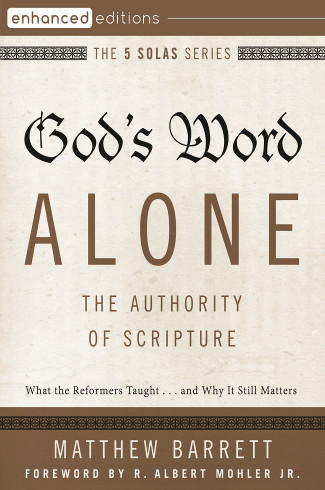A Comprehensive Guide to Sola Scriptura: "God's Word Alone" by Matthew Barrett -Book Review-
- Danny

- Feb 28, 2023
- 3 min read
Sola Scriptura is a cry that began since the reformation, but the idea of "God's Word" alone has been in place since the beginning of time, where God's Words spoke everything into existence. Of course, God has graciously preserved His written Word for us. Growing up in the church, it has always been given that the Bible is the final authority. Unfortunately, I was never taught how that worked exactly. I was just taught to believe it. I never knew that the Reformers had to pay heavy prices for this privilege I took for granted, nor did anyone teach me what the Bible actually had to say about itself. As a result of this lack of knowledge, doubts hit me like a train once I began looking at different views on the Bible. Thankfully, I ended up where I started, with the Bible as my ultimate authority.

My experience is the same for many young people who grew up in the church. It is important to teach the nature of God's Word instead of just expecting your kids to take on whatever worldview you tell them to take on. If the Bible is indeed our final authority, then we better be darn sure that we understand why that works and how that works.
At this current moment in time, I am teaching a series on Bible interpretation at my youth group. The upcoming lesson is on the authority and self-witness of the Scriptures. This is why I picked up this book, and it's been immensely helpful.
Overview
God's Word Alone begins with a history of this idea of Sola Scriptura. It starts off at the Reformation with Luther, and how the Reformers fought against Rome and her exaltation of the Church and tradition above the Bible. It also talks about the skepticism of the enlightenment, the dangers of Liberalism, and the relativism of postmodernism in today's time. Significant names are mentioned in this section of the book, both those who attacked the authority of the Bible and those who defended it. Significant events are also mentioned.
The second section deals with God's Words in redemptive history. Barrett traces the presence of God's "Words" (in their many forms) throughout the Biblical narrative. From creation to the writing of the law, from the cries of the prophets to the Word made flesh, Barrett demonstrates how God's covenantal words worked throughout His redemptive history, culminating in the person of Christ, God's Word personified. Essentially, this section teaches us what the point of God's Words is and gives us the "whole counsel of Scripture" on how everything fits together and points toward the ultimate savior.
The third section teaches us the fine points of Sola Scriptura. It goes through the characteristics of God's words. The authority, inerrancy, clarity, and sufficiency of scripture are all covered by this section. Barrett goes through how the Bible testifies to each of its own characteristics as well as how contemporary challenges may be answered.
Note: this book is part 1 of the 5 Solas series, read the rest if you want to learn more about the 5 Solas of the Reformation.
Why Read This?
This book is the best guide to the question of the authority of Scripture I have ever read. There are certainly more comprehensive works (such as the worst of B.B. Warfield), but this one is very accessible and covers a wide range of topics. Anyone who wants to have confidence in the Bible's self-authenticating nature will be delighted after reading this book. Additionally, I especially enjoyed the history section of the book, and I think Christians should take the time to read and understand just how much sacrifice had to be made in order for them to have a Bible that they can rely upon on their laps. A Christian who does not believe in the final authority of the Bible is a miserable Christian because if the Bible were not authoritative, inerrant, clear, or sufficient, they have no absolute hope of salvation. On the other hand, a Christian who believes in the authority of the Bible but never bothered to ask the Bible why also lives on rocky ground, for they will not withstand the challenges of the enemy.
Potential Pitfalls
If you are looking for scientific or historic or whatever extra-biblical sources of proof for the Bible, this book is not for you. This book's general interest is in the self-authenticating nature of the Bible. You will be better off reading apologetics literature rather than this theological book. And I think it's very important to know the historic, scientific, logical, and ethical proofs of the Bible. Although none of those things should trump the Bible in authority, they should, by definition, all point towards the authority of the Bible. To reach those who see those things as the ultimate authority, we should seek to understand things from their perspective.








Comments